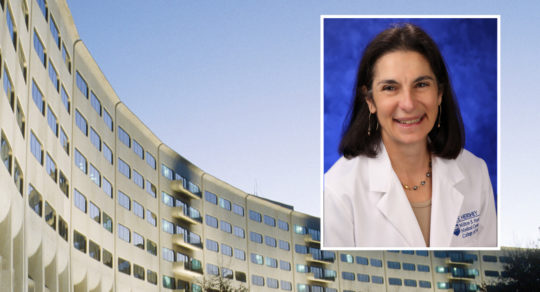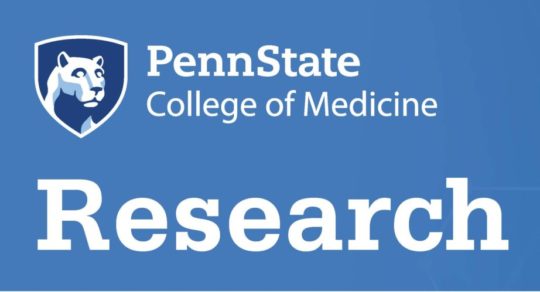Fellowship
Rheumatology
The Rheumatology Fellowship at Penn State Health Milton S. Hershey Medical Center is a two-year, ACGME-accredited program that admits one fellow per year.
Explore More
The Rheumatology Fellowship at Penn State Health Milton S. Hershey Medical Center is a two-year, ACGME-accredited program that admits one fellow per year.

Program Overview
The Division of Rheumatology, part of the Department of Medicine at Penn State Health Milton S. Hershey Medical Center and Penn State College of Medicine, proudly offers a fellowship designed to prepare individuals for a career in rheumatology. It is the program's goal to achieve an optimal balance between clinical training, didactic learning and research activities. If interested in joining our fellowship, please apply through ERAS. Our interview dates for 2025 are as follows:
Sept. 12, noon-5 p.m.
Sept. 26, noon-5 p.m.
Oct. 3, noon-5 p.m.
Oct. 24, noon-5 p.m.
Learn More about the Fellowship
Interested applicants must apply through ERAS. The program participates in the National Resident Matching Program (NRMP) for selection of all candidates.
Each application is thoroughly evaluated by the rheumatology faculty. A limited pool of applicants is selected for interview based upon evidence of superior credentials as documented in the written application. Final selection of interviewed applicants is selected on the basis of overall perceived potential, communication skills, motivation and integrity. Interviews are invitation only.
Qualified candidates must:
have graduated from an accredited medical school
have successfully completed an ACGME-accredited residency training program
submit three letters of recommendation via ERAS (preferably, but not required, including one from a rheumatologist)
be eligible for Pennsylvania State Board of Medicine licensure
if on a visa, be on a J-1 visa, be ECFMG-eligible and have passed USMLE Step 3
General Contact Information
Fax: 717-531-8274
Supporting Your Training
Curriculum Details
The first year of the fellowship is primarily focused on clinical training. During this year, the fellow splits their time between the inpatient consult service and the outpatient clinical experience.
Under the supervision of a faculty attending physician, the inpatient fellow assumes responsibility for all consultations in addition to teaching medical residents and students. Consultation rounds take place daily with a team consisting of a faculty preceptor, the fellow, one or two medical residents, and one or two medical students. This arrangement provides critical longitudinal experience in rheumatic diseases, which are frequently chronic in nature.
During the months of outpatient rotation, fellows participate in daily clinics where they see a wide range of rheumatology patients under the mentorship of faculty members, as well as two half-day continuity fellow clinics a week at the main hospital, and one half-day clinic at the VA Hospital. The outpatient continuity clinic is individual-education-driven by dedicated faculty for one-on-one teaching and mentoring with the fellow.
During elective rotations, fellows participate in outpatient subspecialty clinics in rehabilitation medicine, musculoskeletal radiology, dermatology, pain management, orthopaedics and pediatric rheumatology.
During all rotations, fellows are expected to participate in regularly scheduled educational activities, which include weekly clinical conference, journal clubs, medicine Grand Rounds, a monthly radiology topics conference and a quarterly rheumatology research conference.
Fellows participate in planning and giving talks to the department and division and participate in resident and student didactic sessions (e.g., Grand Rounds, noon conference), with additional time for this in the second year.
In addition to these clinical and educational activities, the first-year fellow is expected to develop and initiate a research and quality review project with the assistance of a faculty mentor.
The second year of training is divided between the inpatient service, outpatient clinical activity and lab or clinical research.
Participation in the continuity outpatient clinic remains throughout the second year. The expectation for the second year is to continue clinical learning as well as further development of research activities with the objective of presentation or publication of the results of this research.
Electives include radiology, sports medicine, lab medicine, musculoskeletal ultrasound training and others offered; electives can also be chosen by the fellow if there is a unique experience they are interested in.
Inpatient Consultation
The fellows’ activity during the inpatient rotation is providing hospital consultations requested from internal medicine, surgery, obstetrics and gynecology, family and community medicine and other services.
This activity provides a broad exposure to clinical rheumatology while allowing ample time for careful follow-up reading and teaching. In particular, the fellow is routinely involved in the management of gout and other crystal arthritides, inflammatory arthritis, vasculitis, systemic lupus erythematosus and the initial diagnosis of suspected rheumatic disease.
The fellow is also expected to take inpatient pages and questions during the inpatient months.
Outpatient Clinics
Experience in the outpatient clinic is emphasized throughout the fellowship, since the majority of rheumatology practice occurs in the ambulatory setting. During the outpatient rotation, the fellows participate in general rheumatology clinics weekly. All are seen under the supervision of faculty attending physicians.
Three half-day continuity clinics per week will be staffed with a supervising physician, but the fellow will assume primary patient management of those patients through follow-up visits and between-visit phone calls and electronic messages. This helps to train with mentoring the expectation of being able to take care of rheumatology patients unsupervised at the end of the fellowship years in order to prepare for clinical practice.
Research training is a major focus of the Rheumatology Fellowship at Penn State Health Milton S. Hershey Medical Center. While the program welcomes all well-qualified applicants, individuals with an interest in an academic career are particularly encouraged to apply. First-year fellows are introduced to the spectrum of research activities conducted within the division and by faculty members affiliated with the training program. Within the first three months of the fellowship, the fellow should be able to identify an appropriate research topic and faculty mentor.
Fellows are expected to submit a brief research proposal within the first year in order to gain experience in devising an experimental plan. These research proposals are assembled with the guidance of the faculty mentor. Fellows may apply for extramural funding during the second year to support additional training.
Attendance and presentations at national meetings are expected, and publications in peer-reviewed journals are anticipated.
Research opportunities for fellows range from basic laboratory bench research to clinical studies.
Ongoing research projects are examining early detection of autoimmune disease and mechanisms of action of anti-rheumatic drugs. Clinical trials in several disease areas are in progress. The division is represented in the Lupus Nephritis Trial Network and the International Myositis Assessment and Clinical Studies Group.
Research activities are also facilitated by Penn State College of Medicine’s Clinical Trials Office and Penn State Clinical and Translational Science Institute.
Fellow core rheumatology conference: In this weekly conference, core rheumatology topics are discussed. This is fellow-driven with faculty supervision and used for board preparation.
Journal club: In this monthly conference, relevant articles from the current literature are presented and critically reviewed with faculty and other members of the team, to include the fellow and rotating residents and medical students.
Rheumatology research conference: In this quarterly conference, members from the Division of Rheumatology or other basic or clinical divisions and departments present their rheumatology-related research data.
Radiology conference: In this monthly conference, clinical patient cases that involve radiological studies are reviewed with a musculoskeletal radiologist and findings discussed. This conference is attended by rheumatology faculty and rotating students and residents.
Patient topics conference: In this monthly conference, clinical patient cases are discussed along with a discussion revolving around management decisions with emphasis on education and evidence-based care related to chosen topics.
Quarterly quality conference: This is sponsored by the Department of Medicine.
Quarterly Morbidity and Mortality conference: This is sponsored by the Department of Medicine.
Rheumatology/nephrology conference: In this conference, the purpose will be to review cases that involve renal failure secondary to rheumatic disease. Best-practice standards as well as pathology of renal biopsies will be discussed.
DPLD MDD conference (Pulmonary)


